人教新目标版英语八年级上册 Unit 3 I'm more outgoing than my sister导学案(含答案)
文档属性
| 名称 | 人教新目标版英语八年级上册 Unit 3 I'm more outgoing than my sister导学案(含答案) |
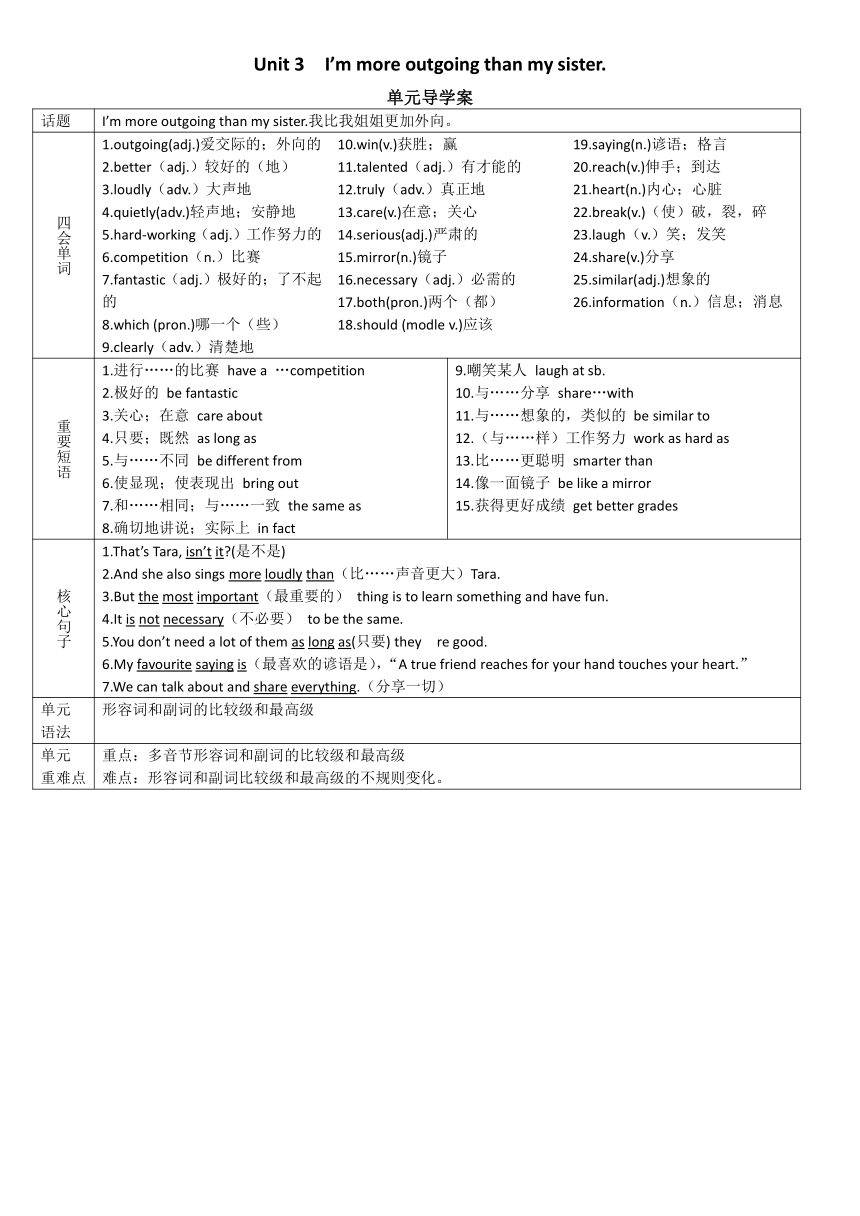
|
|
| 格式 | doc | ||
| 文件大小 | 112.3KB | ||
| 资源类型 | 教案 | ||
| 版本资源 | 人教新目标(Go for it)版 | ||
| 科目 | 英语 | ||
| 更新时间 | 2023-07-05 00:00:00 | ||
图片预览

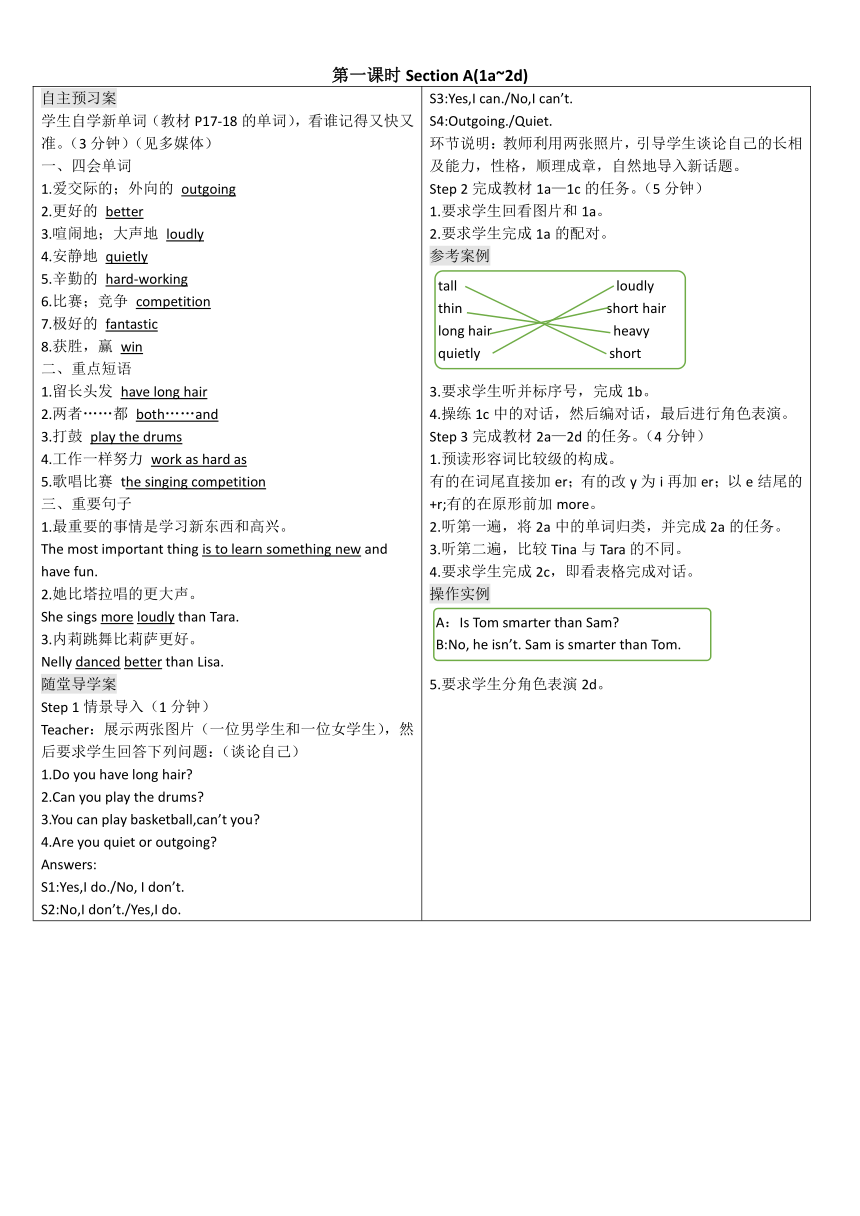
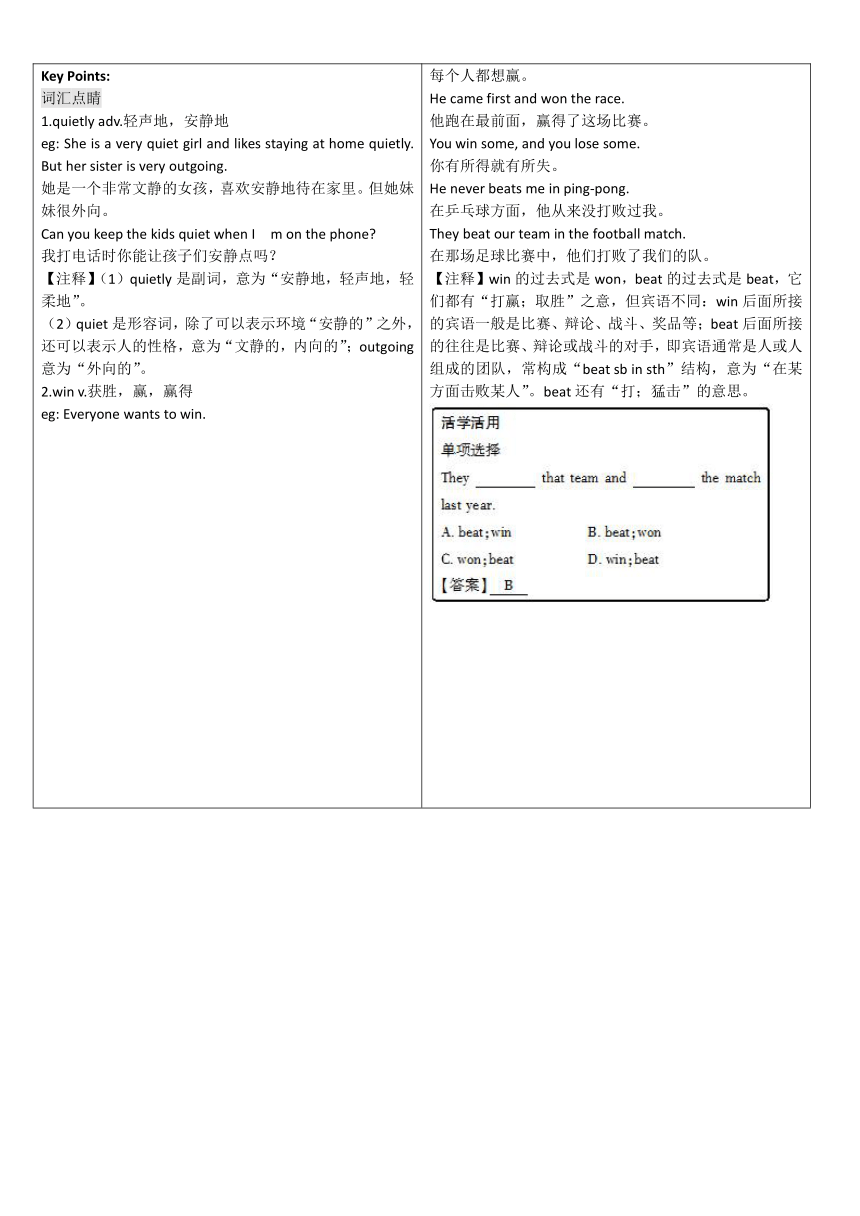
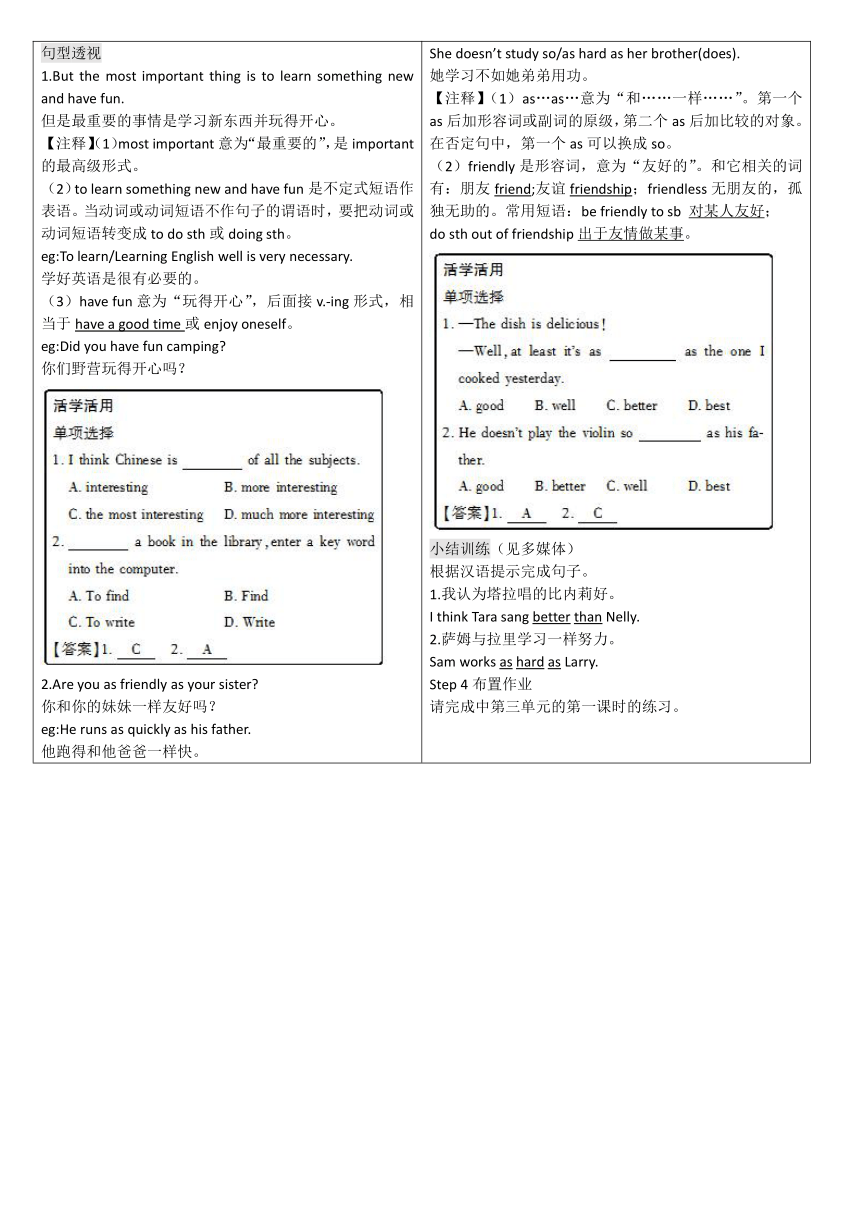
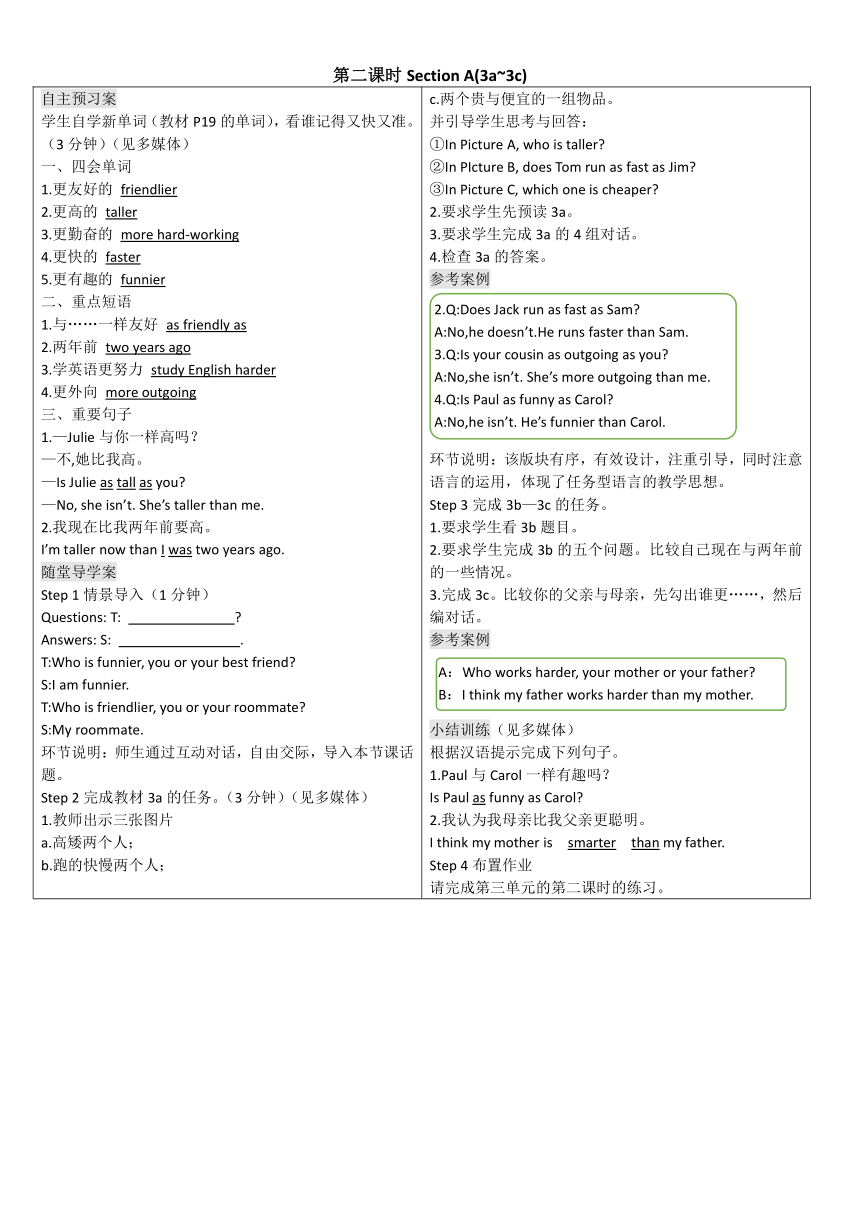
文档简介
Unit 3 I’m more outgoing than my sister.
单元导学案
话题 I’m more outgoing than my sister.我比我姐姐更加外向。
四会单词 1.outgoing(adj.)爱交际的;外向的 2.better(adj.)较好的(地) 3.loudly(adv.)大声地 4.quietly(adv.)轻声地;安静地 5.hard-working(adj.)工作努力的 6.competition(n.)比赛 7.fantastic(adj.)极好的;了不起的 8.which (pron.)哪一个(些) 9.clearly(adv.)清楚地 10.win(v.)获胜;赢 11.talented(adj.)有才能的 12.truly(adv.)真正地 13.care(v.)在意;关心 14.serious(adj.)严肃的 15.mirror(n.)镜子 16.necessary(adj.)必需的 17.both(pron.)两个(都) 18.should (modle v.)应该 19.saying(n.)谚语;格言 20.reach(v.)伸手;到达 21.heart(n.)内心;心脏 22.break(v.)(使)破,裂,碎 23.laugh(v.)笑;发笑 24.share(v.)分享 25.similar(adj.)想象的 26.information(n.)信息;消息
重要短语 1.进行……的比赛 have a …competition 2.极好的 be fantastic 3.关心;在意 care about 4.只要;既然 as long as 5.与……不同 be different from 6.使显现;使表现出 bring out 7.和……相同;与……一致 the same as 8.确切地讲说;实际上 in fact 9.嘲笑某人 laugh at sb. 10.与……分享 share…with 11.与……想象的,类似的 be similar to 12.(与……样)工作努力 work as hard as 13.比……更聪明 smarter than 14.像一面镜子 be like a mirror 15.获得更好成绩 get better grades
核心句子 1.That’s Tara, isn’t it (是不是) 2.And she also sings more loudly than(比……声音更大)Tara. 3.But the most important(最重要的) thing is to learn something and have fun. 4.It is not necessary(不必要) to be the same. 5.You don’t need a lot of them as long as(只要) they?re good. 6.My favourite saying is(最喜欢的谚语是),“A true friend reaches for your hand touches your heart.” 7.We can talk about and share everything.(分享一切)
单元 语法 形容词和副词的比较级和最高级
单元 重难点 重点:多音节形容词和副词的比较级和最高级 难点:形容词和副词比较级和最高级的不规则变化。
第一课时Section A(1a~2d)
自主预习案 学生自学新单词(教材P17-18的单词),看谁记得又快又准。(3分钟)(见多媒体) 一、四会单词 1.爱交际的;外向的 outgoing 2.更好的 better 3.喧闹地;大声地 loudly 4.安静地 quietly 5.辛勤的 hard-working 6.比赛;竞争 competition 7.极好的 fantastic 8.获胜,赢 win 二、重点短语 1.留长头发 have long hair 2.两者……都 both……and 3.打鼓 play the drums 4.工作一样努力 work as hard as 5.歌唱比赛 the singing competition 三、重要句子 1.最重要的事情是学习新东西和高兴。 The most important thing is to learn something new and have fun. 2.她比塔拉唱的更大声。 She sings more loudly than Tara. 3.内莉跳舞比莉萨更好。 Nelly danced better than Lisa. 随堂导学案 Step 1情景导入(1分钟) Teacher:展示两张图片(一位男学生和一位女学生),然后要求学生回答下列问题:(谈论自己) 1.Do you have long hair 2.Can you play the drums 3.You can play basketball,can’t you 4.Are you quiet or outgoing Answers: S1:Yes,I do./No, I don’t. S2:No,I don’t./Yes,I do. S3:Yes,I can./No,I can’t. S4:Outgoing./Quiet. 环节说明:教师利用两张照片,引导学生谈论自己的长相及能力,性格,顺理成章,自然地导入新话题。 Step 2完成教材1a—1c的任务。(5分钟) 1.要求学生回看图片和1a。 2.要求学生完成1a的配对。 参考案例 (
tall loudly
thin short hair
long hair heavy
quietly short
) 3.要求学生听并标序号,完成1b。 4.操练1c中的对话,然后编对话,最后进行角色表演。 Step 3完成教材2a—2d的任务。(4分钟) 1.预读形容词比较级的构成。 有的在词尾直接加er;有的改y为i再加er;以e结尾的+r;有的在原形前加more。 2.听第一遍,将2a中的单词归类,并完成2a的任务。 3.听第二遍,比较Tina与Tara的不同。 4.要求学生完成2c,即看表格完成对话。 操作实例 (
A
:
Is Tom smarter than Sam
B:No, he isn’t. Sam is smarter than Tom.
) 5.要求学生分角色表演2d。
Key Points: 词汇点睛 1.quietly adv.轻声地,安静地 eg: She is a very quiet girl and likes staying at home quietly. But her sister is very outgoing. 她是一个非常文静的女孩,喜欢安静地待在家里。但她妹妹很外向。 Can you keep the kids quiet when I?m on the phone 我打电话时你能让孩子们安静点吗? 【注释】(1)quietly是副词,意为“安静地,轻声地,轻柔地”。 (2)quiet是形容词,除了可以表示环境“安静的”之外,还可以表示人的性格,意为“文静的,内向的”;outgoing意为“外向的”。 2.win v.获胜,赢,赢得 eg: Everyone wants to win. 每个人都想赢。 He came first and won the race. 他跑在最前面,赢得了这场比赛。 You win some, and you lose some. 你有所得就有所失。 He never beats me in ping-pong. 在乒乓球方面,他从来没打败过我。 They beat our team in the football match. 在那场足球比赛中,他们打败了我们的队。 【注释】win的过去式是won,beat的过去式是beat,它们都有“打赢;取胜”之意,但宾语不同:win后面所接的宾语一般是比赛、辩论、战斗、奖品等;beat后面所接的往往是比赛、辩论或战斗的对手,即宾语通常是人或人组成的团队,常构成“beat sb in sth”结构,意为“在某方面击败某人”。beat还有“打;猛击”的意思。
句型透视 1.But the most important thing is to learn something new and have fun. 但是最重要的事情是学习新东西并玩得开心。 【注释】(1)most important意为“最重要的”,是important的最高级形式。 (2)to learn something new and have fun是不定式短语作表语。当动词或动词短语不作句子的谓语时,要把动词或动词短语转变成to do sth或doing sth。 eg:To learn/Learning English well is very necessary. 学好英语是很有必要的。 (3)have fun意为“玩得开心”,后面接v.-ing形式,相当于have a good time或enjoy oneself。 eg:Did you have fun camping 你们野营玩得开心吗? 2.Are you as friendly as your sister 你和你的妹妹一样友好吗? eg:He runs as quickly as his father. 他跑得和他爸爸一样快。 She doesn’t study so/as hard as her brother(does). 她学习不如她弟弟用功。 【注释】(1)as…as…意为“和……一样……”。第一个as后加形容词或副词的原级,第二个as后加比较的对象。在否定句中,第一个as可以换成so。 (2)friendly是形容词,意为“友好的”。和它相关的词有:朋友friend;友谊friendship;friendless无朋友的,孤独无助的。常用短语:be friendly to sb 对某人友好; do sth out of friendship出于友情做某事。 小结训练(见多媒体) 根据汉语提示完成句子。 1.我认为塔拉唱的比内莉好。 I think Tara sang better than Nelly. 2.萨姆与拉里学习一样努力。 Sam works as hard as Larry. Step 4布置作业 请完成中第三单元的第一课时的练习。
第二课时Section A(3a~3c)
自主预习案 学生自学新单词(教材P19的单词),看谁记得又快又准。(3分钟)(见多媒体) 一、四会单词 1.更友好的 friendlier 2.更高的 taller 3.更勤奋的 more hard-working 4.更快的 faster 5.更有趣的 funnier 二、重点短语 1.与……一样友好 as friendly as 2.两年前 two years ago 3.学英语更努力 study English harder 4.更外向 more outgoing 三、重要句子 1.—Julie与你一样高吗? —不,她比我高。 —Is Julie as tall as you —No, she isn’t. She’s taller than me. 2.我现在比我两年前要高。 I’m taller now than I was two years ago. 随堂导学案 Step 1情景导入(1分钟) Questions: T: Answers: S: . T:Who is funnier, you or your best friend S:I am funnier. T:Who is friendlier, you or your roommate S:My roommate. 环节说明:师生通过互动对话,自由交际,导入本节课话题。 Step 2完成教材3a的任务。(3分钟)(见多媒体) 1.教师出示三张图片 a.高矮两个人; b.跑的快慢两个人; c.两个贵与便宜的一组物品。 并引导学生思考与回答: ①In Picture A, who is taller ②In PIcture B, does Tom run as fast as Jim ③In Picture C, which one is cheaper 2.要求学生先预读3a。 3.要求学生完成3a的4组对话。 4.检查3a的答案。 参考案例 (
2.Q:Does Jack run as fast as Sam
A:No,he doesn’t.He runs faster than Sam.
3.Q:Is your cousin as outgoing as you
A:No,she isn’t. She’s more outgoing than me.
4.Q:Is Paul as funny as Carol
A:No,he isn’t. He’s funnier than Carol.
) 环节说明:该版块有序,有效设计,注重引导,同时注意语言的运用,体现了任务型语言的教学思想。 Step 3完成3b—3c的任务。 1.要求学生看3b题目。 2.要求学生完成3b的五个问题。比较自己现在与两年前的一些情况。 3.完成3c。比较你的父亲与母亲,先勾出谁更……,然后编对话。 参考案例 (
A
:
Who works harder, your mother or your father
B
:
I think my father works harder than my mother.
) 小结训练(见多媒体) 根据汉语提示完成下列句子。 1.Paul与Carol一样有趣吗? Is Paul as funny as Carol 2.我认为我母亲比我父亲更聪明。 I think my mother is smarter than my father. Step 4布置作业 请完成第三单元的第二课时的练习。
第三课时单元语法精讲与精练
(见P22)
第四课时Section B(1a~1e))
自主预习案 学生自学新单词(教材P20的单词),看谁记得又快又准。(3分钟)(见多媒体) 一、四会单词 1.有才能的;有才干的 talented 2.真正地;确实地 truly 3.在意;担忧;关心 care 二、重点短语 1.关心;在意 care about 2.在……方面有才能 be talented in 3.与……一样 the same as 4.擅长于 be good at 5.使某人笑 make sb. laugh 三、重要句子 1.他们两人个子都高。 They are both tall. 2.Molly比她的最好朋友学习更努力。 Molly studies harder than her best friend. 随堂导学案 Step 1情景导入(2分钟) 教师询问部分学生: Questions: 1.Who is your friend 2.Does your friend have cool clothes 3.Is your friend talented in dancing 4.Can he/she make you laugh Answers:…… S1:Bill is my friend. S2:Yes,he does. S3:Yes,he is. S4:Yes,he can. 环节说明:此处通过师生互问互答,谈论同学们最熟悉,最想谈论的“好朋友”,既可增加师生友谊,又可直接导入本节课的话题。 Step 2完成1a—1b的任务。 1.要求学生预读1a。 2.要求学生对1a中的7个句子排序。 3.要求学生完成1b。 参考案例 (
A:I think a good friend has cool clothes.
B:For me, a good friend truly cares about me.
C:Yes,and a good friend is a good listener.
) Step 3完成1c—1e的任务。 1.预读1c的图表。 带着Molly及Mary对朋友的观点去听。 2.听第一遍,完成1c的表格。 3.听第二遍,完成1d的要求。 4.再听一遍,重温这一对话的中心思想和每一个细节。 5.谈论Molly,Mary及其好朋友,完成1e的任务。 环节说明:此环节是一个听力训练的环节,分步听及分任务听,有利于训练学生获取信息,书写英语句子的能力。
Key Points: 词汇点睛 1.care v.在意,担忧,关心 eg:I don’t really care if my friends are the same as me or different. 我并不十分在乎我的朋友是否跟我一样或与我不同。 A good friend really cares about you. 一个好朋友会真正地关心你。 Take care! Be careful!小心!/当心! We must learn to take care of/look after ourselves. 我们必须学会照顾自己。 【注释】care作动词时,意为“在意,关心”;后跟宾语时,一般加介词about。care还可作名词,意为“小心,照顾”。 【搭配】关心,在意care about;当心take care/be careful;照顾,照看take care of/look after。 【拓展】 2.both adj.& pron.两个;两个都 eg:We both like sports 我们都喜欢运动。(作副词) Both brothers are clever. 兄弟俩都聪明。(作形容词) Both of the books are useful. 两本书都有用。(作代词) Both English and math are very important. 英语和数学都很重要。(作连词) 【注释】(1)both意为“两个,两者都”,在句中可作副词、形容词、代词或连词。作副词时,常放在be动词或情态动词之后,实义动词之前。 (2)“both of+名词复数”作主语时,谓语动词用复数形式。both…and…意为“两者都……”,连接主语时,其谓语动词用复数形式。其反义词组为neither…nor…,意为“两者都不……”,连接主语时,其谓语动词遵循“就近原则”。 eg:Neither you nor Tom is right. 你和汤姆都不对。 (3)both和all,表示“都,全部”。both指两个人或物,而all指三个或三个以上的人或物。
句型透视 A good friend makes me laugh. 一个好朋友使我发笑。 eg:His mother made him a cake. =His mother made a cake for him. 他妈妈为他做了一个蛋糕。 The news made him happy. 这个消息使他高兴。 The teacher made him stand outside the classroom. 老师让他站在教室外面。 【注释】make 的用法: (1)当make表示“制造,制作”时,常用句型“make sb sth/make sth for sb”,意为“给某人制作某物”。 (2)当make表示“使”时,常用的结构是“make sb/sth+adj.”,意为“使某人/某物处于某种状态”。 (3)make sb do sth意为“使某人做某事”。 【拓展】(1)make 短语总结:make money 挣钱; make faces 做鬼脸;make friends with sb 与某人交朋友; make a mistake 犯错误。 (2)make,have,let和get均为使役动词。其常用结构: make/have/let sb do sth 让某人做某事 get sb to do sth 让某人做某事 小结训练(见多媒体) 根据汉语提示完成句子。 1.好朋友是一个好的听众。 A good friend is a good listener. 2.玛丽与她的最好朋友个子都高。 Mary and her best friend are both tall. Step 4布置作业 请完成中第三单元的第四课时的练习。
第五课时Section B (2a~4))
自主预习案 学生自学新单词(教材P21-23的单词),看谁记得又快又准。(3分钟)(见多媒体) 一、四会单词 1.镜子 mirror 2.必需的 necessary 3.成绩;等级 grade 4.应该;应当 should 5.谚语;格言 saying 6.伸手;到达 reach 7.心脏;内心 heart 8.手臂;上肢 arm 9.分享;共用 share 10.类似的 similar 二、重点短语 1.确切地说;事实上 in fact 2.与……分享 share with 3.与……想象的;类似的 be similar to 4.小学 primary school 5.只要;既然 as long as 三、重要句子 1.好朋友就像一面镜子。 A good friend is like a mirror. 2.我真的不在意朋友们是否与我一样或不同。 I don’t really care if my friends are the same as me or different. 3.我的朋友比我更加勤奋。 My friend is more hard-working than me. 随堂导学案 Step 1情景导入(2分钟) 教师与学生谈论a good friend。 T:What is your friend S:He/She truly cares about me. He/She always has cool clothes. T:What things do you think are important in a friend S:I think for a friend the important thing is to care about me or make me laugh/like to do the some thing as me and so on. 环节说明:本环节通过师生互动,生生互问答,有效地活跃了课堂气氛,并直接导入了本话题。 Step 2完成2a—2e的任务。 1.要求学生预读2a。 2.学生完成2a的任务。 参考案例 (
My friend Li Ming is more popular than me, but I am quieter than him.
) 3.要求学生讨论“朋友应该是一样还是不同?” 4.读2b并给比较级的形容词画线。 5.再读2b然后完成2c的任务判断句子的正误。 6.写作:完成2d并写出5个句子,比较你与你的朋友。 7.学习2e中的谚语。 操作案例 (
1.
一位好朋友是一面镜子。
2.
朋友就像书籍——你不要太多只要够好。
3.
我最好的朋友(能够)帮我激发出自己的所能。
4.
一个真正的朋友是在需要时给你帮助,使你感动。
) Step 3完成3a—4的任务。 参考案例 (
Wang Lingling
’
s best friend is Liu Lili.
They are both tall,
but they have different hair.
Wang Lingling has long straight hair.
L
iu Lili has short straight hair.
They also have different likes.
Wang Lili likes reading,
but Liu Lili likes sports.
They are both pop
ular and outgoing but Wang Lingling is more serious and more hard-working.
)
Key Points: 词汇点睛 reach v.伸手,到达,抵达 eg:A true friend reaches for your hand and touches your heart. 一个真正的朋友在需要时给你帮助,使你感动。 【注释】(1)reach作不及物动词,表示“伸手去够某物”时,后常加介词for。 eg:The little boy tried to reach for the apple on the table,but he didn?t reach it. 这个小男孩尽力去够桌子上的苹果,但是没有够到。 (2)表示“到达,抵达”时,和get to,arrive at/in同义。注意:reach是及物动词;get和arrive是不及物动词,其后接宾语时,须先加相应介词。 句型透视 1.I’m shy so it’s not easy for me to make friends. 我害羞,所以交朋友对我来说不容易。 【注释】“It is+形容词+(for sb)+to do sth.”意为“做某事(对某人来说)是……的。”其中it为形式主语,不定式短语是真正的主语。 eg:It is easy to work out the problem. 算出这道题是容易的。 【拓展】在“It is+形容词+for/of sb+to do sth.”句型中,若形容词是描述行为者的性格、品质的,如kind, good, nice, clever等,用of sb;若形容词仅仅是描述事物,而不是对行为者的品格进行评价,如difficult, easy, hard, important, dangerous, (im)possible等,则用for sb。 eg:It’s very kind of you to help me. 你能帮我,真好。 It’s very dangerous for children to cross the busy street. 对孩子们来说,穿过繁忙的街道很危险。 2.That’s why I like reading books and I study harder in class. 这就是我喜欢看书而且在班上学习更努力的原因。 【注释】“That’s why…”为固定句型,表示“这就是……的原因。”why后面一般接句子。 Step 4布置作业 请完成第三单元的第五课时的练习。
单元导学案
话题 I’m more outgoing than my sister.我比我姐姐更加外向。
四会单词 1.outgoing(adj.)爱交际的;外向的 2.better(adj.)较好的(地) 3.loudly(adv.)大声地 4.quietly(adv.)轻声地;安静地 5.hard-working(adj.)工作努力的 6.competition(n.)比赛 7.fantastic(adj.)极好的;了不起的 8.which (pron.)哪一个(些) 9.clearly(adv.)清楚地 10.win(v.)获胜;赢 11.talented(adj.)有才能的 12.truly(adv.)真正地 13.care(v.)在意;关心 14.serious(adj.)严肃的 15.mirror(n.)镜子 16.necessary(adj.)必需的 17.both(pron.)两个(都) 18.should (modle v.)应该 19.saying(n.)谚语;格言 20.reach(v.)伸手;到达 21.heart(n.)内心;心脏 22.break(v.)(使)破,裂,碎 23.laugh(v.)笑;发笑 24.share(v.)分享 25.similar(adj.)想象的 26.information(n.)信息;消息
重要短语 1.进行……的比赛 have a …competition 2.极好的 be fantastic 3.关心;在意 care about 4.只要;既然 as long as 5.与……不同 be different from 6.使显现;使表现出 bring out 7.和……相同;与……一致 the same as 8.确切地讲说;实际上 in fact 9.嘲笑某人 laugh at sb. 10.与……分享 share…with 11.与……想象的,类似的 be similar to 12.(与……样)工作努力 work as hard as 13.比……更聪明 smarter than 14.像一面镜子 be like a mirror 15.获得更好成绩 get better grades
核心句子 1.That’s Tara, isn’t it (是不是) 2.And she also sings more loudly than(比……声音更大)Tara. 3.But the most important(最重要的) thing is to learn something and have fun. 4.It is not necessary(不必要) to be the same. 5.You don’t need a lot of them as long as(只要) they?re good. 6.My favourite saying is(最喜欢的谚语是),“A true friend reaches for your hand touches your heart.” 7.We can talk about and share everything.(分享一切)
单元 语法 形容词和副词的比较级和最高级
单元 重难点 重点:多音节形容词和副词的比较级和最高级 难点:形容词和副词比较级和最高级的不规则变化。
第一课时Section A(1a~2d)
自主预习案 学生自学新单词(教材P17-18的单词),看谁记得又快又准。(3分钟)(见多媒体) 一、四会单词 1.爱交际的;外向的 outgoing 2.更好的 better 3.喧闹地;大声地 loudly 4.安静地 quietly 5.辛勤的 hard-working 6.比赛;竞争 competition 7.极好的 fantastic 8.获胜,赢 win 二、重点短语 1.留长头发 have long hair 2.两者……都 both……and 3.打鼓 play the drums 4.工作一样努力 work as hard as 5.歌唱比赛 the singing competition 三、重要句子 1.最重要的事情是学习新东西和高兴。 The most important thing is to learn something new and have fun. 2.她比塔拉唱的更大声。 She sings more loudly than Tara. 3.内莉跳舞比莉萨更好。 Nelly danced better than Lisa. 随堂导学案 Step 1情景导入(1分钟) Teacher:展示两张图片(一位男学生和一位女学生),然后要求学生回答下列问题:(谈论自己) 1.Do you have long hair 2.Can you play the drums 3.You can play basketball,can’t you 4.Are you quiet or outgoing Answers: S1:Yes,I do./No, I don’t. S2:No,I don’t./Yes,I do. S3:Yes,I can./No,I can’t. S4:Outgoing./Quiet. 环节说明:教师利用两张照片,引导学生谈论自己的长相及能力,性格,顺理成章,自然地导入新话题。 Step 2完成教材1a—1c的任务。(5分钟) 1.要求学生回看图片和1a。 2.要求学生完成1a的配对。 参考案例 (
tall loudly
thin short hair
long hair heavy
quietly short
) 3.要求学生听并标序号,完成1b。 4.操练1c中的对话,然后编对话,最后进行角色表演。 Step 3完成教材2a—2d的任务。(4分钟) 1.预读形容词比较级的构成。 有的在词尾直接加er;有的改y为i再加er;以e结尾的+r;有的在原形前加more。 2.听第一遍,将2a中的单词归类,并完成2a的任务。 3.听第二遍,比较Tina与Tara的不同。 4.要求学生完成2c,即看表格完成对话。 操作实例 (
A
:
Is Tom smarter than Sam
B:No, he isn’t. Sam is smarter than Tom.
) 5.要求学生分角色表演2d。
Key Points: 词汇点睛 1.quietly adv.轻声地,安静地 eg: She is a very quiet girl and likes staying at home quietly. But her sister is very outgoing. 她是一个非常文静的女孩,喜欢安静地待在家里。但她妹妹很外向。 Can you keep the kids quiet when I?m on the phone 我打电话时你能让孩子们安静点吗? 【注释】(1)quietly是副词,意为“安静地,轻声地,轻柔地”。 (2)quiet是形容词,除了可以表示环境“安静的”之外,还可以表示人的性格,意为“文静的,内向的”;outgoing意为“外向的”。 2.win v.获胜,赢,赢得 eg: Everyone wants to win. 每个人都想赢。 He came first and won the race. 他跑在最前面,赢得了这场比赛。 You win some, and you lose some. 你有所得就有所失。 He never beats me in ping-pong. 在乒乓球方面,他从来没打败过我。 They beat our team in the football match. 在那场足球比赛中,他们打败了我们的队。 【注释】win的过去式是won,beat的过去式是beat,它们都有“打赢;取胜”之意,但宾语不同:win后面所接的宾语一般是比赛、辩论、战斗、奖品等;beat后面所接的往往是比赛、辩论或战斗的对手,即宾语通常是人或人组成的团队,常构成“beat sb in sth”结构,意为“在某方面击败某人”。beat还有“打;猛击”的意思。
句型透视 1.But the most important thing is to learn something new and have fun. 但是最重要的事情是学习新东西并玩得开心。 【注释】(1)most important意为“最重要的”,是important的最高级形式。 (2)to learn something new and have fun是不定式短语作表语。当动词或动词短语不作句子的谓语时,要把动词或动词短语转变成to do sth或doing sth。 eg:To learn/Learning English well is very necessary. 学好英语是很有必要的。 (3)have fun意为“玩得开心”,后面接v.-ing形式,相当于have a good time或enjoy oneself。 eg:Did you have fun camping 你们野营玩得开心吗? 2.Are you as friendly as your sister 你和你的妹妹一样友好吗? eg:He runs as quickly as his father. 他跑得和他爸爸一样快。 She doesn’t study so/as hard as her brother(does). 她学习不如她弟弟用功。 【注释】(1)as…as…意为“和……一样……”。第一个as后加形容词或副词的原级,第二个as后加比较的对象。在否定句中,第一个as可以换成so。 (2)friendly是形容词,意为“友好的”。和它相关的词有:朋友friend;友谊friendship;friendless无朋友的,孤独无助的。常用短语:be friendly to sb 对某人友好; do sth out of friendship出于友情做某事。 小结训练(见多媒体) 根据汉语提示完成句子。 1.我认为塔拉唱的比内莉好。 I think Tara sang better than Nelly. 2.萨姆与拉里学习一样努力。 Sam works as hard as Larry. Step 4布置作业 请完成中第三单元的第一课时的练习。
第二课时Section A(3a~3c)
自主预习案 学生自学新单词(教材P19的单词),看谁记得又快又准。(3分钟)(见多媒体) 一、四会单词 1.更友好的 friendlier 2.更高的 taller 3.更勤奋的 more hard-working 4.更快的 faster 5.更有趣的 funnier 二、重点短语 1.与……一样友好 as friendly as 2.两年前 two years ago 3.学英语更努力 study English harder 4.更外向 more outgoing 三、重要句子 1.—Julie与你一样高吗? —不,她比我高。 —Is Julie as tall as you —No, she isn’t. She’s taller than me. 2.我现在比我两年前要高。 I’m taller now than I was two years ago. 随堂导学案 Step 1情景导入(1分钟) Questions: T: Answers: S: . T:Who is funnier, you or your best friend S:I am funnier. T:Who is friendlier, you or your roommate S:My roommate. 环节说明:师生通过互动对话,自由交际,导入本节课话题。 Step 2完成教材3a的任务。(3分钟)(见多媒体) 1.教师出示三张图片 a.高矮两个人; b.跑的快慢两个人; c.两个贵与便宜的一组物品。 并引导学生思考与回答: ①In Picture A, who is taller ②In PIcture B, does Tom run as fast as Jim ③In Picture C, which one is cheaper 2.要求学生先预读3a。 3.要求学生完成3a的4组对话。 4.检查3a的答案。 参考案例 (
2.Q:Does Jack run as fast as Sam
A:No,he doesn’t.He runs faster than Sam.
3.Q:Is your cousin as outgoing as you
A:No,she isn’t. She’s more outgoing than me.
4.Q:Is Paul as funny as Carol
A:No,he isn’t. He’s funnier than Carol.
) 环节说明:该版块有序,有效设计,注重引导,同时注意语言的运用,体现了任务型语言的教学思想。 Step 3完成3b—3c的任务。 1.要求学生看3b题目。 2.要求学生完成3b的五个问题。比较自己现在与两年前的一些情况。 3.完成3c。比较你的父亲与母亲,先勾出谁更……,然后编对话。 参考案例 (
A
:
Who works harder, your mother or your father
B
:
I think my father works harder than my mother.
) 小结训练(见多媒体) 根据汉语提示完成下列句子。 1.Paul与Carol一样有趣吗? Is Paul as funny as Carol 2.我认为我母亲比我父亲更聪明。 I think my mother is smarter than my father. Step 4布置作业 请完成第三单元的第二课时的练习。
第三课时单元语法精讲与精练
(见P22)
第四课时Section B(1a~1e))
自主预习案 学生自学新单词(教材P20的单词),看谁记得又快又准。(3分钟)(见多媒体) 一、四会单词 1.有才能的;有才干的 talented 2.真正地;确实地 truly 3.在意;担忧;关心 care 二、重点短语 1.关心;在意 care about 2.在……方面有才能 be talented in 3.与……一样 the same as 4.擅长于 be good at 5.使某人笑 make sb. laugh 三、重要句子 1.他们两人个子都高。 They are both tall. 2.Molly比她的最好朋友学习更努力。 Molly studies harder than her best friend. 随堂导学案 Step 1情景导入(2分钟) 教师询问部分学生: Questions: 1.Who is your friend 2.Does your friend have cool clothes 3.Is your friend talented in dancing 4.Can he/she make you laugh Answers:…… S1:Bill is my friend. S2:Yes,he does. S3:Yes,he is. S4:Yes,he can. 环节说明:此处通过师生互问互答,谈论同学们最熟悉,最想谈论的“好朋友”,既可增加师生友谊,又可直接导入本节课的话题。 Step 2完成1a—1b的任务。 1.要求学生预读1a。 2.要求学生对1a中的7个句子排序。 3.要求学生完成1b。 参考案例 (
A:I think a good friend has cool clothes.
B:For me, a good friend truly cares about me.
C:Yes,and a good friend is a good listener.
) Step 3完成1c—1e的任务。 1.预读1c的图表。 带着Molly及Mary对朋友的观点去听。 2.听第一遍,完成1c的表格。 3.听第二遍,完成1d的要求。 4.再听一遍,重温这一对话的中心思想和每一个细节。 5.谈论Molly,Mary及其好朋友,完成1e的任务。 环节说明:此环节是一个听力训练的环节,分步听及分任务听,有利于训练学生获取信息,书写英语句子的能力。
Key Points: 词汇点睛 1.care v.在意,担忧,关心 eg:I don’t really care if my friends are the same as me or different. 我并不十分在乎我的朋友是否跟我一样或与我不同。 A good friend really cares about you. 一个好朋友会真正地关心你。 Take care! Be careful!小心!/当心! We must learn to take care of/look after ourselves. 我们必须学会照顾自己。 【注释】care作动词时,意为“在意,关心”;后跟宾语时,一般加介词about。care还可作名词,意为“小心,照顾”。 【搭配】关心,在意care about;当心take care/be careful;照顾,照看take care of/look after。 【拓展】 2.both adj.& pron.两个;两个都 eg:We both like sports 我们都喜欢运动。(作副词) Both brothers are clever. 兄弟俩都聪明。(作形容词) Both of the books are useful. 两本书都有用。(作代词) Both English and math are very important. 英语和数学都很重要。(作连词) 【注释】(1)both意为“两个,两者都”,在句中可作副词、形容词、代词或连词。作副词时,常放在be动词或情态动词之后,实义动词之前。 (2)“both of+名词复数”作主语时,谓语动词用复数形式。both…and…意为“两者都……”,连接主语时,其谓语动词用复数形式。其反义词组为neither…nor…,意为“两者都不……”,连接主语时,其谓语动词遵循“就近原则”。 eg:Neither you nor Tom is right. 你和汤姆都不对。 (3)both和all,表示“都,全部”。both指两个人或物,而all指三个或三个以上的人或物。
句型透视 A good friend makes me laugh. 一个好朋友使我发笑。 eg:His mother made him a cake. =His mother made a cake for him. 他妈妈为他做了一个蛋糕。 The news made him happy. 这个消息使他高兴。 The teacher made him stand outside the classroom. 老师让他站在教室外面。 【注释】make 的用法: (1)当make表示“制造,制作”时,常用句型“make sb sth/make sth for sb”,意为“给某人制作某物”。 (2)当make表示“使”时,常用的结构是“make sb/sth+adj.”,意为“使某人/某物处于某种状态”。 (3)make sb do sth意为“使某人做某事”。 【拓展】(1)make 短语总结:make money 挣钱; make faces 做鬼脸;make friends with sb 与某人交朋友; make a mistake 犯错误。 (2)make,have,let和get均为使役动词。其常用结构: make/have/let sb do sth 让某人做某事 get sb to do sth 让某人做某事 小结训练(见多媒体) 根据汉语提示完成句子。 1.好朋友是一个好的听众。 A good friend is a good listener. 2.玛丽与她的最好朋友个子都高。 Mary and her best friend are both tall. Step 4布置作业 请完成中第三单元的第四课时的练习。
第五课时Section B (2a~4))
自主预习案 学生自学新单词(教材P21-23的单词),看谁记得又快又准。(3分钟)(见多媒体) 一、四会单词 1.镜子 mirror 2.必需的 necessary 3.成绩;等级 grade 4.应该;应当 should 5.谚语;格言 saying 6.伸手;到达 reach 7.心脏;内心 heart 8.手臂;上肢 arm 9.分享;共用 share 10.类似的 similar 二、重点短语 1.确切地说;事实上 in fact 2.与……分享 share with 3.与……想象的;类似的 be similar to 4.小学 primary school 5.只要;既然 as long as 三、重要句子 1.好朋友就像一面镜子。 A good friend is like a mirror. 2.我真的不在意朋友们是否与我一样或不同。 I don’t really care if my friends are the same as me or different. 3.我的朋友比我更加勤奋。 My friend is more hard-working than me. 随堂导学案 Step 1情景导入(2分钟) 教师与学生谈论a good friend。 T:What is your friend S:He/She truly cares about me. He/She always has cool clothes. T:What things do you think are important in a friend S:I think for a friend the important thing is to care about me or make me laugh/like to do the some thing as me and so on. 环节说明:本环节通过师生互动,生生互问答,有效地活跃了课堂气氛,并直接导入了本话题。 Step 2完成2a—2e的任务。 1.要求学生预读2a。 2.学生完成2a的任务。 参考案例 (
My friend Li Ming is more popular than me, but I am quieter than him.
) 3.要求学生讨论“朋友应该是一样还是不同?” 4.读2b并给比较级的形容词画线。 5.再读2b然后完成2c的任务判断句子的正误。 6.写作:完成2d并写出5个句子,比较你与你的朋友。 7.学习2e中的谚语。 操作案例 (
1.
一位好朋友是一面镜子。
2.
朋友就像书籍——你不要太多只要够好。
3.
我最好的朋友(能够)帮我激发出自己的所能。
4.
一个真正的朋友是在需要时给你帮助,使你感动。
) Step 3完成3a—4的任务。 参考案例 (
Wang Lingling
’
s best friend is Liu Lili.
They are both tall,
but they have different hair.
Wang Lingling has long straight hair.
L
iu Lili has short straight hair.
They also have different likes.
Wang Lili likes reading,
but Liu Lili likes sports.
They are both pop
ular and outgoing but Wang Lingling is more serious and more hard-working.
)
Key Points: 词汇点睛 reach v.伸手,到达,抵达 eg:A true friend reaches for your hand and touches your heart. 一个真正的朋友在需要时给你帮助,使你感动。 【注释】(1)reach作不及物动词,表示“伸手去够某物”时,后常加介词for。 eg:The little boy tried to reach for the apple on the table,but he didn?t reach it. 这个小男孩尽力去够桌子上的苹果,但是没有够到。 (2)表示“到达,抵达”时,和get to,arrive at/in同义。注意:reach是及物动词;get和arrive是不及物动词,其后接宾语时,须先加相应介词。 句型透视 1.I’m shy so it’s not easy for me to make friends. 我害羞,所以交朋友对我来说不容易。 【注释】“It is+形容词+(for sb)+to do sth.”意为“做某事(对某人来说)是……的。”其中it为形式主语,不定式短语是真正的主语。 eg:It is easy to work out the problem. 算出这道题是容易的。 【拓展】在“It is+形容词+for/of sb+to do sth.”句型中,若形容词是描述行为者的性格、品质的,如kind, good, nice, clever等,用of sb;若形容词仅仅是描述事物,而不是对行为者的品格进行评价,如difficult, easy, hard, important, dangerous, (im)possible等,则用for sb。 eg:It’s very kind of you to help me. 你能帮我,真好。 It’s very dangerous for children to cross the busy street. 对孩子们来说,穿过繁忙的街道很危险。 2.That’s why I like reading books and I study harder in class. 这就是我喜欢看书而且在班上学习更努力的原因。 【注释】“That’s why…”为固定句型,表示“这就是……的原因。”why后面一般接句子。 Step 4布置作业 请完成第三单元的第五课时的练习。
同课章节目录
- Unit 1 Where did you go on vacation?
- Section A
- Section B
- Unit 2 How often do you exercise?
- Section A
- Section B
- Unit 3 I'm more outgoing than my sister.
- Section A
- Section B
- Unit 4 What's the best movie theater?
- Section A
- Section B
- Unit 5 Do you want to watch a game show?
- Section A
- Section B
- Unit 6 I'm going to study computer science.
- Section A
- Section B
- Unit 7 Will people have robots?
- Section A
- Section B
- Unit 8 How do you make a banana milk shake?
- Section A
- Section B
- Unit 9 Can you come to my party?
- Section A
- Section B
- Unit 10 If you go to the party, you'll have a grea
- Section A
- Section B
